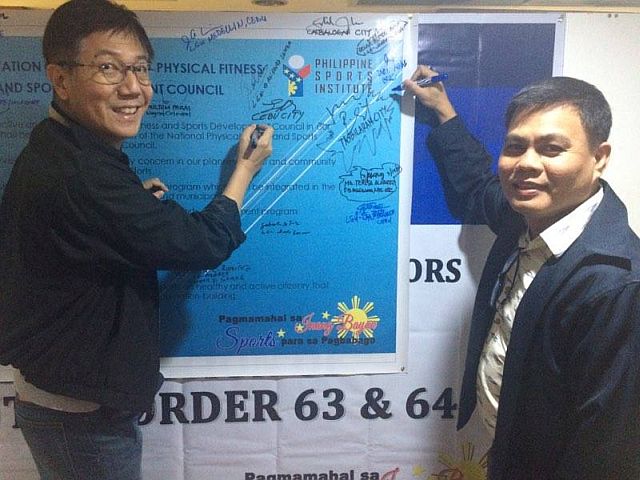
Edward Hayco (left), chairman of the Cebu City Sports Commission, and lawyer Ramil Abing, chairman of Cebu Provincial Sports Commission, sign a manifesto signifying their support to the programs of the Philippine Sports Commission. (CDN PHOTO/CALVIN D. CORDOVA)
A STEP in the right direction.
Yesterday’s meeting between the officials of the Philippine Sports Commission (PSC) and various local government units (LGUs) in the Visayas was warmly welcomed as they plotted out the country’s sports development program.
“We’re happy with the turnout, we were happy that mayors and governors from the Visayas attended this meeting. Through this activity, the LGUs now have the grasp of what really is the direction that PSC is taking. We are here to help the LGUs craft their own sports program,” said PSC Commissioner Charles Raymond Maxey.
Held at the King’s Hall of Crown Regency Hotel, the meeting was held for the reactivation of Executive Orders 63 and 64 or the National Physical Fitness and Sports Development Program.
PSC Chairman Butch Ramirez spearheaded the meeting.
“I am glad with this consultative meeting with governors and mayors from the Visayas because it will give us the assurance of their support for our grassroots program. It gives us big hopes for the implementation of regional games like the Batang Pinoy, Philippine National Games and other projects,” said Ramirez.
Ramirez said the meeting will help the LGUs strengthen their sports program starting from the grassroots.
“We are not giving solution but we are giving them opportunity to create a sports consultative meeting that will guide their direction,” said Ramirez.
PSC Commissioner Ramon “El Presidente” Fernandez said the meeting also provided local government officials an avenue to air their concerns.
“We are here to encourage them, to listen to their concerns. Their number one concern is the budget. We just have to make do with the available budget that we have. We are hoping to get additional budget from the government,” said Fernandez.
Yesterday was the first of a series of consultative meetings with the LGUS. A similar meeting will be held in Davao on March 16. Next stops will be in Naga, Baguio, Batangas and National Capital Region.
EOs 63 and 64 are the main components in the implementation of the Philippine Sports Institute (PSI).
Smart ID
Under PSI, the LGUs’ grassroots development will be given more attention.
“One of the important components in our grassroots program are the LGUs. We need to tap the mayors and the governors in the identification of athletes,” said Fernandez.
The uniformed and scientific identification of athletes is PSI’s main program.
“From elementary to high school, athletes should already be identified,” said Fernandez, referring to PSI’s Sports Mapping Action Research Talent Identification (Smart ID).
“Under Smart ID, the athletes’ height will be checked, as well as the strengths of their legs and their upper body. It is a scientific way of checking the physiology of the athlete,” Fernandez explained.
“There will be several stages in the identification. They will go through several levels until they reach the elite level,” Fernandez added.
Ed Hayco, chairman of the Cebu City Sports Commission (CCSC), said PSC’s effort to reach out to the community is commendable.
“We are fortunate to have a PSC chairman like Ramirez. He inspires us to excel. He speaks from the heart. This forum is his way of reaching out to the people who can really implement the grassroots program,” Hayco said.